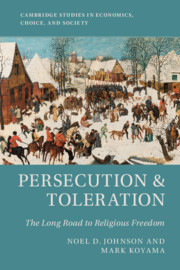Book contents
- Frontmatter
- Contents
- List of Figures
- List of Tables
- Preface
- Acknowledgments
- 1 Toleration, Persecution, and State Capacity
- I Conditional Toleration
- II The Origins Of Religious Freedom
- III Implications Of Greater Religious Liberty
- 11 The Persecution of Witchcraft
- 12 Religious Minorities and Economic Growth
- 13 The Emergence of Modern States, Religious Freedom, and Modern Economic Growth
- 14 Applying Our Argument to the Rest of theWorld
- 15 Modern States, Liberalism, and Religious Freedom
- 16 Conclusions
- Bibliography
- Index
15 - Modern States, Liberalism, and Religious Freedom
from III - Implications Of Greater Religious Liberty
Published online by Cambridge University Press: 18 February 2019
- Frontmatter
- Contents
- List of Figures
- List of Tables
- Preface
- Acknowledgments
- 1 Toleration, Persecution, and State Capacity
- I Conditional Toleration
- II The Origins Of Religious Freedom
- III Implications Of Greater Religious Liberty
- 11 The Persecution of Witchcraft
- 12 Religious Minorities and Economic Growth
- 13 The Emergence of Modern States, Religious Freedom, and Modern Economic Growth
- 14 Applying Our Argument to the Rest of theWorld
- 15 Modern States, Liberalism, and Religious Freedom
- 16 Conclusions
- Bibliography
- Index
Summary
The twentieth century saw totalitarian states repress freedom on a previously unimaginable scale. Did the same developments that produced the modern state also give rise to totalitarianism? In this chapter we discuss why the rise of more powerful and capable states was a double-edged sword. The existence of a parallel path to totalitarianism is consistent with our argument. It also serves as a reminder of the fragility of liberalism and its dependence on shared prosperity.
Premodern states were weak – they lacked the capacity to raise taxes and to enforce general laws – and illiberal. They governed through identity rules and relied on religion to provide legitimacy. In some cases this led them to tolerate a measure of religious diversity. But this toleration was always conditional. In other times and places, these same factors gave rise to religious persecution. The absence of religious freedom was “built in” to the structure of all premodern states.
The kinds of polities that emerged for the first time in Europe after 1600 changed this. These were modern states that had the ability to both raise large amounts of tax revenues and to legislate behavior.
The shadow of the twentieth century looms large over any discussion of state power. The totalitarian states of the mid-twentieth century not only conducted mass slaughter on an industrial scale, but also presaged the elimination of the possibility of private life and independent thought. Outside North Korea, there are no such states in the world today, butmodern technology opens up the possibility of states restricting offensive or risky behaviors by private individuals. There is no doubt that the power of the modern security state poses a threat to liberty. Genuine commitment to freedom of speech and freedom of thought is rare among politicians even in societies that pay lip service to liberal values.
Progressives celebrate the power of the managerial state to improve the lives of ordinary people. They are opposed by classical liberals and conservatives who wish either to preserve a sphere of freedom for individuals or communities, or disagreed with the direction of economic and social policies. This contemporary debate between advocates of state power as a mechanism for social improvement and its opponents, while crucial for understanding twentieth- and twenty-first-century politics in the developed world,may not be the best lens for viewing developments in premodern Europe or in the developing world today.
- Type
- Chapter
- Information
- Persecution and TolerationThe Long Road to Religious Freedom, pp. 281 - 292Publisher: Cambridge University PressPrint publication year: 2019



